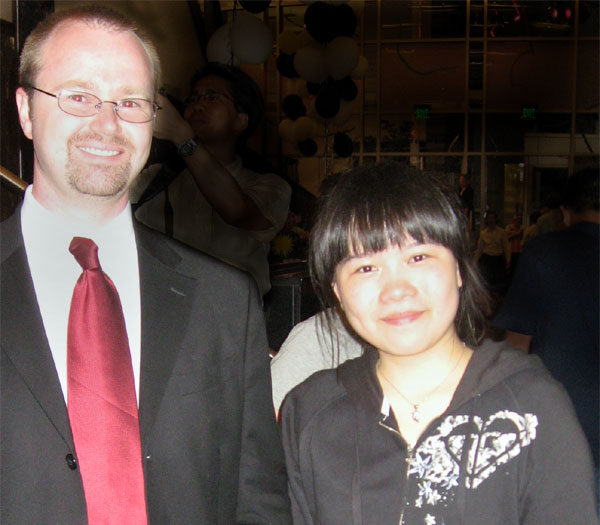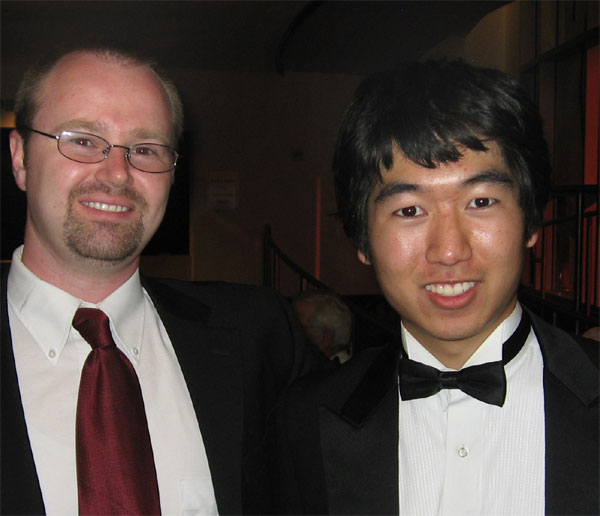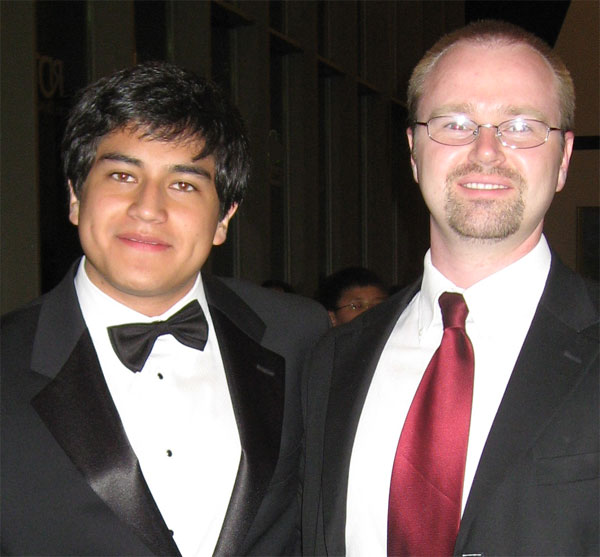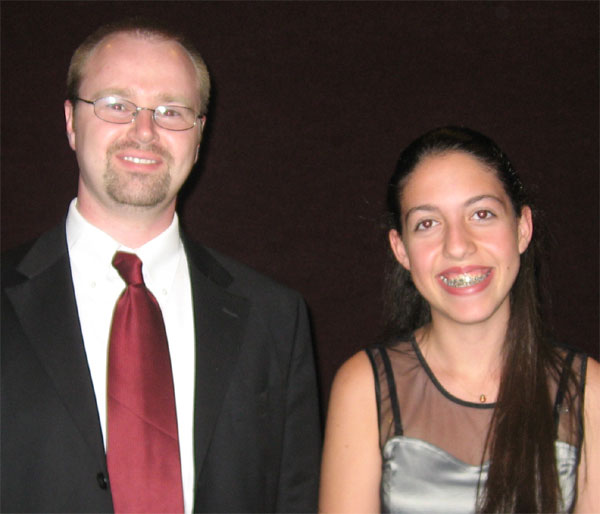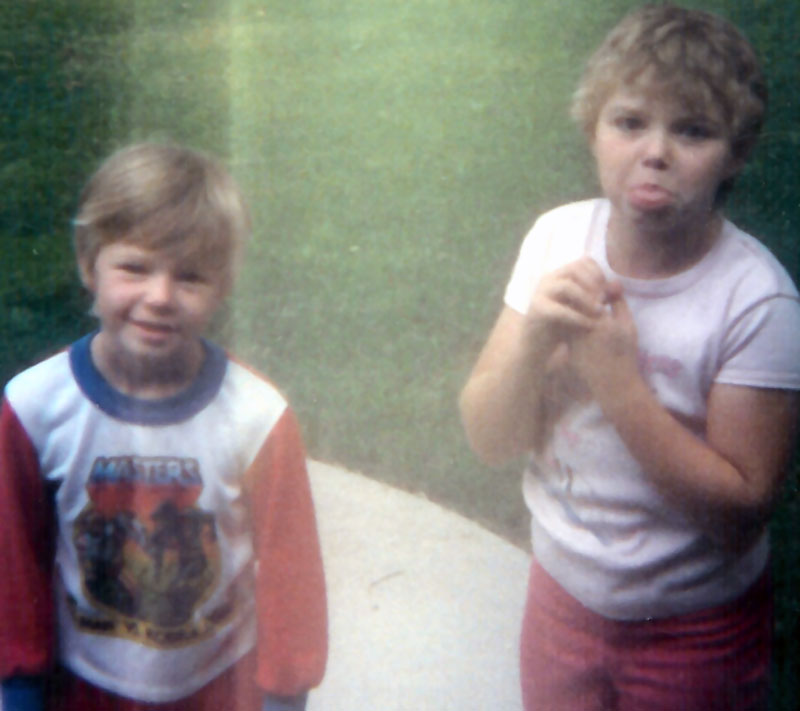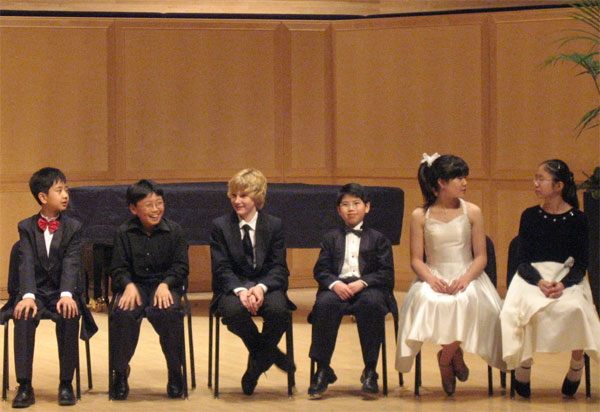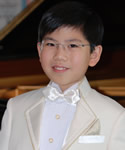 Jonathan Bowman is a dear friend of mine who is currently studying at the famous Eastman School of Music (you can view Jonathan's website here). Jonathan and I attended Brigham Young University together where he completed his degree in music and I in engineering. We both studied piano with Dr. Paul Pollei, the founder of the Gina Bachauer International Piano Foundation. Last night I had the pleasure of attending one of Jonathan's recitals. He is in town for the holidays and planned an informal recital for local friends and family to attend. Typically when I post about a performance I will dive right into the works and the music from the evening... however, I'd like to take a moment to better describe Jonathan and the wonderful musician that he is.
Jonathan Bowman is a dear friend of mine who is currently studying at the famous Eastman School of Music (you can view Jonathan's website here). Jonathan and I attended Brigham Young University together where he completed his degree in music and I in engineering. We both studied piano with Dr. Paul Pollei, the founder of the Gina Bachauer International Piano Foundation. Last night I had the pleasure of attending one of Jonathan's recitals. He is in town for the holidays and planned an informal recital for local friends and family to attend. Typically when I post about a performance I will dive right into the works and the music from the evening... however, I'd like to take a moment to better describe Jonathan and the wonderful musician that he is.About the Performer
 As I mentioned, Jonathan and I studied piano together at BYU. We were a few years apart in age and he was not yet an official student of the university but attended master classes as directed by Dr. Paul Pollei. I got to know Jonathan better than I did some of the others in the class because I had the opportunity of chatting with him after master class while he would wait for his father to come and pick him up. The first work that I heard Jonathan perform was Beethoven's "Moonlight" Sonata. I remember this specifically because I was so deeply impressed by the technical skill that he demonstrated in the third movement. The second piece I heard him perform (also in master class) was Liszt's Totentanz Concerto. I was still fairly new to the world of classical piano at that time and so I hadn't heard that piece before (now I have at least 5 different recordings and have heard it performed dozens of times ;) ). I will never forget watching as this timid, shy, young man slowly made his way to the piano, quietly introduced the work, paused briefly, and then hammered his fingers onto the keys with an unbelievable force that disrupted my entire image of what was about to occur. As I listened to Jonathan perform that evening I fell in love with that composition and was left with a powerful impression of Jonathan's music that still reverberates inside me.
As I mentioned, Jonathan and I studied piano together at BYU. We were a few years apart in age and he was not yet an official student of the university but attended master classes as directed by Dr. Paul Pollei. I got to know Jonathan better than I did some of the others in the class because I had the opportunity of chatting with him after master class while he would wait for his father to come and pick him up. The first work that I heard Jonathan perform was Beethoven's "Moonlight" Sonata. I remember this specifically because I was so deeply impressed by the technical skill that he demonstrated in the third movement. The second piece I heard him perform (also in master class) was Liszt's Totentanz Concerto. I was still fairly new to the world of classical piano at that time and so I hadn't heard that piece before (now I have at least 5 different recordings and have heard it performed dozens of times ;) ). I will never forget watching as this timid, shy, young man slowly made his way to the piano, quietly introduced the work, paused briefly, and then hammered his fingers onto the keys with an unbelievable force that disrupted my entire image of what was about to occur. As I listened to Jonathan perform that evening I fell in love with that composition and was left with a powerful impression of Jonathan's music that still reverberates inside me.Now Jonathan is working on his Master's and Doctorate degrees, has a beautiful family, and displays a great confidence and enthusiasm for his hard-earned talents. I always enjoy hearing him perform and was delighted to receive an invitation to last night's event.
About the Performance
Jonathan's recital included 4 works - skillfully selected and wonderfully executed. He opened with Scriabin's Etude in C-sharp Minor (Op 42, No. 5) which demonstrated his excellent technique and dynamics. He then performed Bach's Toccata in C minor which demonstrated his intellect and mental capacities for music. He then played three excerpts from a transcription of Stravinsky's "Firebird". Although I have a great appreciation for Stravinsky and what he contributed to music, I have struggled to connect with his music. However, Jonathan made me rethink my position on Stravinsky and his performance of the Suite sparked my interest. Had the evening ended at that point, I would have left a very satisfied listener. Fortunately, he had one more work to perform - Liszt's "Benediction de Dieu dans la Solitude" ("The Blessing of God in Solitude).
About Liszt's Work
"Benediction de Dieu dans la Solitude" is one of the works that makes up Liszt's "Harmonies Poetiques et Religieuses" (Harmonies of Poetry and Religion). These are deeply meditative, introspective works that represent Liszt, his beliefs, his sorrows, joys, and everything that made him such a complex human being. Throughout the course of these wonderful compositions Liszt emotionally, mentally, and spiritually strips himself down to the core and puts himself on display through music - hiding nothing. Some of my greatest spiritual experiences through music have come as a result of these amazing works. So I was thrilled to see that Jonathan was including this piece as a part of his performance. This work was inspired by a poem by Lamartine (who was inspiration to many of Liszt's works) that reads as follows (English translation):
Whence comes this faith with which my heart overflows
To me who, not long ago, uncertain, restless
And tossed on waves of doubt by every wind
Sought the good, the true, in the dreams of worldy sages
And peace in hearts resounding with tempests
Scarcely have a few days brushed past my brow
And it seems that a century and a world have passed away
And that, separated from them by an immense abyss
A new man is reborn and begins again in me.
The words and meaning of this poem are echoed through Liszt's music. I was deeply touched as I listened to Jonathan peform this great work. I was moved near to tears as I contemplated the thoughts, emotions, and circumstances that may have inspired its composition. I was reminded of the important role that music must play in our lives - as a conduit to allow the heart to express what words cannot; and to impress upon the soul the things that language inadequately communicates. Music should not be viewed merely as entertainment that tickles the ears and moves the feet; but as an art that touches the heart and lifts the soul; as an expression that opens the mind and bonds the hearts of man to God.
To Jonathan: Thank you for allowing me to be inspired and uplifted once again through great music. It means even more when such a performance comes from a friend. I look forward to the next opportunity I have to be a part of your musical journey.
















